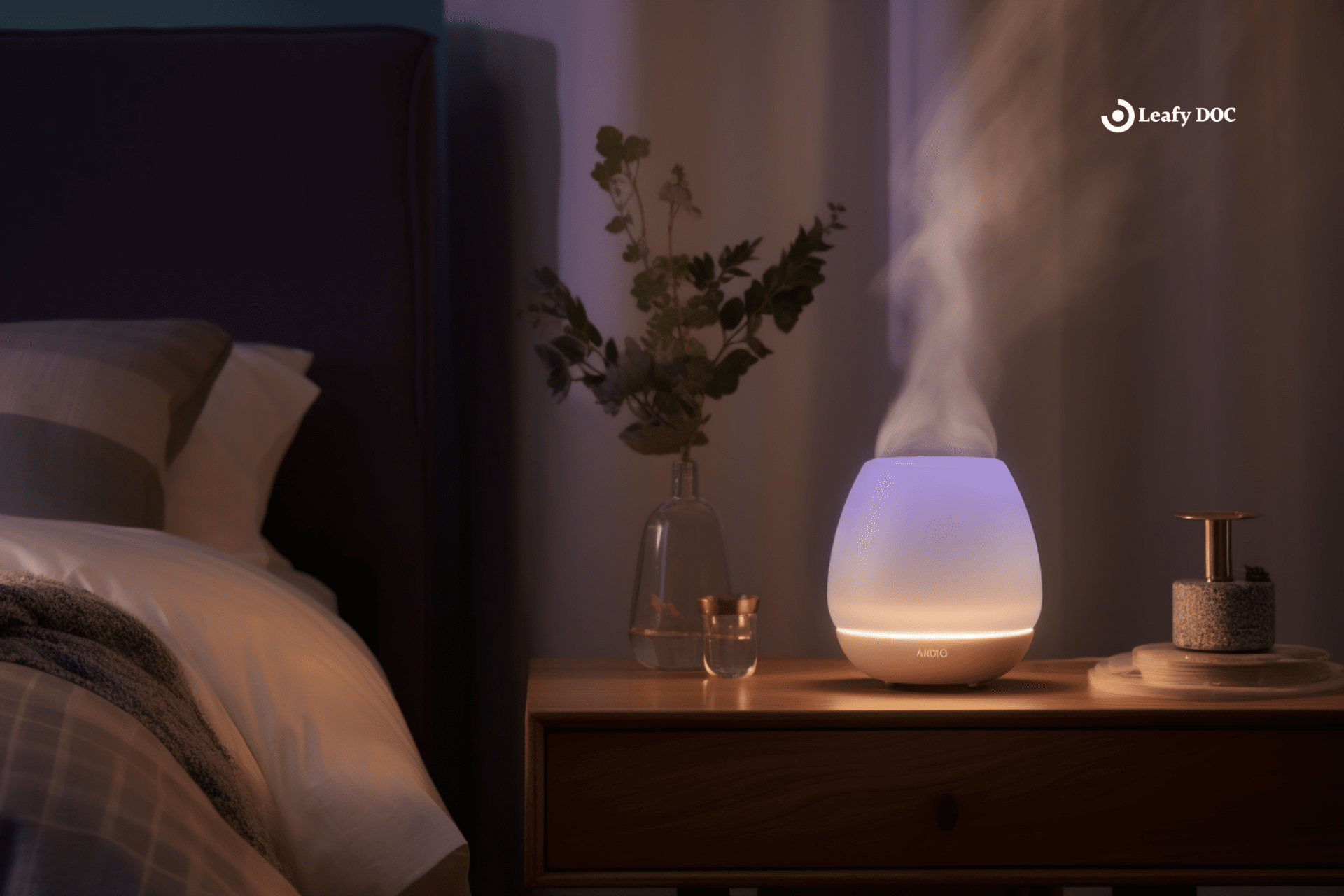A Guide On Relaxing Terpenes For Better Sleep
by Haley Mills · August 29, 2023
Discover the power of relaxing terpenes and unlock a peaceful night’s sleep. Say goodbye to restless nights and hello to ultimate relaxation. Click now!

Are you struggling to get a good night’s sleep? Tossing and turning, unable to quiet your mind and relax? If so, then it’s time to consider the power of terpenes. While you may have heard of terpenes about their aromatic properties in plants, they also have remarkable effects on our bodies and minds. This guide will explore the science behind relaxing terpenes and how they can help improve your sleep quality.
Terpenes are organic compounds found in a variety of plants, including cannabis, fruits, and herbs. They are responsible for these plants’ distinct aromas and flavors and have been used for centuries in traditional medicine for their therapeutic properties. Recent research has shown that certain terpenes have relaxing effects on the body, helping to reduce anxiety and promote better sleep. By understanding the science behind these terpenes and incorporating them into your sleep routine, you can experience a more restful and rejuvenating night’s sleep. So, let’s dive into the world of relaxing terpenes and discover how they can transform your sleep quality.
What Are Terpenes?
Terpenes, those aromatic compounds found in various plants including cannabis, are like nature’s chill pill, helping us relax and unwind for a better night’s sleep. These organic compounds are responsible for plants’ distinct smells and flavors, and they have been used for centuries in traditional medicine and aromatherapy. Terpenes can be found in a wide variety of plants, such as lavender, chamomile, and citrus fruits, and they have been shown to have numerous therapeutic effects, including reducing anxiety and promoting sleep.
When it comes to sleep, certain terpenes are particularly effective in promoting relaxation and helping with insomnia. For example, linalool, which is found in lavender, has been shown to have sedative properties and can help induce a state of calmness and relaxation. Another terpene, myrcene, which is found in hops and mangoes, has been found to have muscle-relaxing and sedative effects. These terpenes work by interacting with receptors in the brain and nervous system, helping to promote sleep and relaxation. So if you’re looking for a natural way to improve your sleep, incorporating terpenes into your bedtime routine may be worth considering.
Understanding the Science Behind Relaxing Terpenes
Terpenes are organic compounds found in many plants, including cannabis, and they are responsible for giving each plant its unique aroma and flavor. But terpenes do more than add scent and taste, they also have a significant impact on our mental and physical well-being.
Certain terpenes have been found to have relaxing and sedating effects when it comes to sleep. One terpene is myrcene, commonly found in herbs like hops, lemongrass, and cannabis. Myrcene has been shown to have a calming effect on the mind and body, making it an ideal terpene for those struggling with sleep issues. Another relaxing terpene is linalool, which is often found in lavender and can help promote a sense of relaxation and tranquility. Linalool has also been found to have analgesic properties, which can be beneficial for those experiencing pain or discomfort that may be interfering with their sleep. By understanding the science behind these relaxing terpenes, we can better harness their power to improve our sleep quality and overall well-being.
Popular Terpenes for Better Sleep
With its calming and soothing aroma, lavender can help you unwind and achieve a restful night’s sleep. This prevalent terpene is known for its relaxing properties and is often used in aromatherapy to promote relaxation and reduce anxiety. Lavender has been used for centuries to aid sleep, and scientific research has supported its effectiveness.
Another popular terpene for better sleep is chamomile. Chamomile is known for its calming effects and is often used as a natural remedy for insomnia. It can help ease anxiety and promote relaxation, making it easier to fall asleep and stay asleep throughout the night. Chamomile can be consumed as a tea or used in essential oil form for aromatherapy.
In addition to lavender and chamomile, other terpenes commonly used for better sleep include bergamot, valerian, and jasmine. These terpenes have sedative properties that can help induce sleep and improve sleep quality. They can be used in various forms such as essential oils, candles, or herbal supplements.
When using terpenes for better sleep, choosing high-quality products and using them safely is vital. It is recommended to consult with a healthcare professional before using any new sleep aids, especially if you have any underlying medical conditions or are taking medications.
Incorporating relaxing terpenes into your sleep routine can help promote a restful night’s sleep. Lavender, chamomile, and other terpenes have calming and soothing properties that can aid in relaxation and reduce insomnia. Using these terpenes as essential oils, teas, or supplements can create a peaceful sleep environment and improve your overall sleep quality.
How to Incorporate Terpenes into Your Sleep Routine
Incorporating relaxing terpenes into your sleep routine can significantly improve the quality of your rest. There are several ways you can incorporate terpenes into your sleep routine. One option is to use essential oils that contain terpenes, such as lavender or chamomile. These oils can be diffused in your bedroom before bedtime or added to a warm bath to create a soothing environment.
Another way to incorporate terpenes into your sleep routine is using terpene-infused products. Many companies now offer products such as pillows, mattresses, and even pajamas that are infused with terpenes known for their relaxing properties. These products allow you to reap the benefits of terpenes throughout the night, promoting deeper and more restful sleep.
Incorporating relaxing terpenes into your sleep routine is a simple and natural way to improve the quality of your rest. Whether you choose to use essential oils or terpene-infused products, you can create a soothing environment that promotes relaxation and better sleep. Give it a try and see how terpenes can enhance your sleep routine.
Tips for Maximizing the Relaxing Effects of Terpenes
Maximizing the relaxing effects of terpenes can significantly enhance your sleep experience. Here are some tips to help you get the most out of these natural compounds.
Firstly, choose the right terpenes for your needs. Different terpenes have different effects, so finding the ones that work best for you is crucial. For example, if you’re looking for relaxation and calmness, terpenes like myrcene and linalool are known for their sedative properties. On the other hand, if you’re looking for a more uplifting and energizing effect, terpenes like limonene and pinene might be more suitable. Experiment with different terpenes to find the ones that help you relax and unwind.
Once you’ve found the best terpenes for you, it’s essential to use them consistently. Incorporating terpenes into your nightly routine can help signal to your body that it’s time to wind down and prepare for sleep. Consider using terpene-infused products such as essential oils, bath salts, or candles in your bedtime routine. You can also try incorporating terpenes into your evening tea or using a terpene-infused pillow spray. Consistency is key when it comes to maximizing the relaxing effects of terpenes, so try to make them a regular part of your sleep routine.
Frequently Asked Questions
Are terpenes safe to use for sleep?
Terpenes are generally safe to use for sleep. They are natural compounds found in plants and can have calming and sedative effects. However, please consult with a healthcare professional before using them.
Can terpenes help with other sleep disorders besides insomnia?
Terpenes can potentially help with other sleep disorders besides insomnia. While more research is needed, certain terpenes have shown promise in promoting relaxation and reducing anxiety, which can be beneficial for various sleep disorders.
Are there any potential side effects of using terpenes for sleep?
Yes, there are potential side effects of using terpenes for sleep. Some people may experience drowsiness, dizziness, or headaches. It’s essential to start with a low dose and consult with a healthcare professional.
Can terpenes interact with other medications or supplements?
Yes, terpenes can potentially interact with other medications and supplements. Be sure to consult with a healthcare professional before using terpenes alongside other medications or supplements to avoid potential interactions or adverse effects.
How long does it typically take for terpenes to start inducing relaxation and promoting better sleep?
It typically takes 15 to 60 minutes for terpenes to start inducing relaxation and promoting better sleep. However, the exact time may vary depending on the individual and the specific terpenes used.
Last Updated: August 8, 2024
Get Approved for Your Medical Marijuana Card in Minutes!

Get Your Medical Card
Connect with a licensed physician online in minutes

Like This Article?
Share with your friends
Table of Contents
Keep Reading
-
Optimize Your Fitness Routine With Cannabis
Transform Your Fitness Regimen with Cannabis: Elevate Your Workouts to New Heights. Unleash the Power of Cannabis for Optimal Performance Today!
-
Is Medical Marijuana Legal in Texas 2024? Your Essential Checklist
Explore the legal status of medical marijuana in Texas for 2024 and understand your options.
-
How Many Ounces Are In A Quarter Pound
Unlock the mystery of converting ounces to a quarter pound and never be confused again! Learn the magic number that will make conversions a breeze. Click here to master the art of ounces to quarter pound conversion now!



